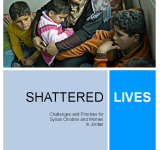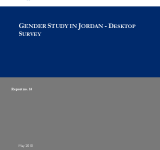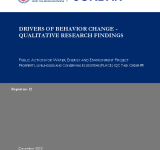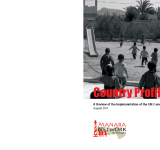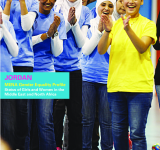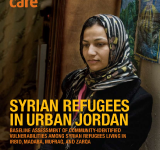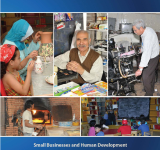With an executive summary on the Syrian refugees situation in Jordan;; the report combines the conclusions of detailed assessments in various areas including as child protection and gender-based violence;; education;; water sanitation and hygiene;; and nutrition and health. It provides a holistic picture of the situation faced by Syrian children and women in Jordan to draw out recommendations for necessary plans of action. Some key findings of the report include growing challenges for water;; sanitation and hygiene situation in Za’atari camp;; several threats to the nutritional status and health of Syrian girls;; boys and women and increasing violence against adolescents. Bringing together the voices of children and women at the camps;; the report examines the situations of Syrian refugees in host communities and refugee camps and finds key recommendations based on them.
والمجتمع
The report presents the findings of a desktop survey conducted to review gender studies in Jordan with an overall goal of the survey as to ensure that gender is adequately addressed throughout project research;; analysis and activities of the Public Action for Water;; Energy and Environment Project (PAP). Under the PAP mandate to encourage water and energy conservation and to support behavior change towards more conservation and efficient practices both at the household level and in the commercial;; industrial and civil society arenas using social marketing behavioral methods;; the report is based on a gender desktop review of existing research on gender and natural resource management in Jordan. It capitalizes on the growing body of research on gender across sectors in Jordan including natural resource management;; to apply and adapt the findings to the PAP project activities. The report concludes with recommendations for the PAP projects such as donor collaboration;; improvement of women’s knowledge of water and energy saving methods;; engagement and creation of women’s participation to promote and support opportunities for small;; women-owned business promoting water and energy saving technologies and promotion of alternative technologies.
The report aims to understand the outlook of Jordanians;; the key determinants of behavioral change in search for “drivers” that can be used in programs promoting conservation of water or energy and reduction of solid waste. This research was conducted as part of the Public Action for Water;; Energy and Environment Project (PAP);; which aims to encourage water and energy conservation and to support behavior change towards more conservation and efficient practices both at the household level and in the commercial;; industrial and civil society arenas using social marketing behavioral methods. It is based on the qualitative research that focuses on identifying people’s motivations;; needs and desires to help formulating social marketing programs and developing adaptive capacity in individuals and groups. Some of the key questions of the qualitative research include “What are the current coping behaviors and attitudes (psychological;; social;; etc …) of the Jordanian public (disaggregated by gender;; age;; geography and income) in the face of limited water availability and high prices for energy?;; What anticipated consequences may the Government face if stricter scenarios were imposed on water and energy? The report recommends the Ministry of Education to cooperate and introduce regular classes that focus on showing youth the direct impact of water;; energy and environment on their lives and raise awareness and consciousness of children regarding their role in the environment and influence it in a positive way.
This report addressed CEDAW Committee by providing a solid and up-to-date information set and analysis of positive policies and legislation taken for women’s advancement and weaknesses that are delaying progress and sustaining disparities. The report covers six components: 1. Jordan’s reservations on CEDAW;; 2. Harmonization of CEDAW into legislation;; 3. Political representation;; 4. Violent against women;; 5. Equal rights in the family;; 6. Conditions of vulnerable and marginalized women. It also provides an overall assessment of the six components covering 3 areas: assessment of the official efforts towards the implementation of CEDAW;; also;; assessment of the civil society efforts and strategies towards monitoring Jordan’s commitment to obligations;; and suggested recommendations for the new concluding observations.
The country profile component of the Manara project is a rigorous and exhaustive report on the status of the implementation of the Convention on the Rights of the Child. It aims to be a resource for identifying gaps and challenges on the status of the implementation of the Convention;; to highlight the recommendations of the Committee on the Rights of the Child on specific matters;; and to identify commendable practices implemented by the State;; civil society and the international community in addressing these issues. The information was collected by exhaustive literature review and followed by field research involving a series of interviews with identified stakeholders;; government ministries and institutions;; local and INGOs;; academics;; unions and professional associations;; media;; religious authorities and United Nations agencies were contacted and interviewed. The structure of the study is based on the following themes: human rights;; children’s rights;; child labor and violence against children
This report is designed to trace the status of girls and women in Jordan. The main themes are: civic rights;; legal rights;; women political participation;; education;; participation in the labour market;; health;; reproductive health;; child protection;; domestic violence;; HIV/AIDS and treaties.
This report is a baseline assessment of community-identified vulnerabilities among Syrian refugees living in Amman;; Irbid;; Madaba;; Mufraq;; and Zarqa. The purpose of this report is to identify urban Syrian refugees’ current coping mechanisms and any gaps in services available to Syrian refugees in Jordan. The research methodology is both qualitative and participatory in design;; drawing from the UNHCR tool for Participatory Assessment in Operations. This report presents only the data from household interviews;; baseline assessment;; and the follow-up focus groups conducted with community members. The number of households surveyed was 240;; with a total number of 1;;476 household members and 89 focus group participants representing 534 household members. The report proposed general recommendations and interventions to deal with the main highlighted challenges (cash assistance;; strengthening community links;; vocational training;; physical activities ...etc).
This report explores the role of Small and Medium-Enterprises (SME);; as an agent for sustainable human development in Jordan. It analyzes SMEs and their contribution to human development using fours key central pillars of human development;; namely: economic growth that is equitable and pro-poor;; social progress;; participation and empowerment through micro finance;; and environmental sustainability. The report analyses the link between SMEs and empowerment or lack thereof;; with a specific focus on the two issues of employment;; as a tool for empowerment;; and the capacity of SMEs to enhance the position of women within the workforce and home. The report findings were based on extensive research;; a survey of 1;;500 firms and focus groups discussions conducted across the governorates of Jordan. The report proposed general recommendations in terms of institutional coordination;; exports;; cluster groups;; quality standard;; government monitoring;; tax law;; local development;; youth empowerment and the increase of minimum wage.
